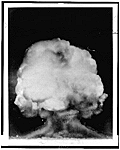Posted on April 30, 2008
Coyle Strikes Again
Missile shield skeptic rattles on
by
Daniel Clark
If conservatives are having trouble motivating themselves to vote this November, they might keep in mind that a Democrat victory could mean the return of Philip Coyle to the Pentagon. An inveterate missile defense skeptic, Coyle is usually presented by the media as if he were a dispassionate scientist offering objective, if harsh, expert opinions.

A typical reference in an April 17th Reuters story about Coyle's recent congressional testimony identified him as having "served from 1994 to 2001 as an assistant secretary of defense and the head of Pentagon arms testing." With credentials like those, his testimony that a missile shield is both unworkable and unnecessary sounds like a pretty compelling indictment of Bush administration policy.
That is, until you recognize that Coyle's tenure in the Defense Department consisted of almost the entirety of the Clinton presidency. Almost immediately after taking office, Clinton began to decimate our missile defense program, and squelch its funding, so that his liberal domestic agenda could reap the benefits of the so-called "peace dividend." The mere fact that Coyle would serve that administration so prominently for so long, without exhibiting any of his trademark rebelliousness, suggests a tolerance for, if not an agreement with, the Clintons' antipathy for national defense.

In reaction to an alarming National Intelligence Estimate on the nuclear capabilities of Iran and North Korea, Congress passed a law in 1999 requiring the deployment of a defensive missile shield as soon as it was "technologically possible." President Clinton initially threatened to veto the bill, but relented after an overwhelming 97-3 passage in the Senate.
Enter Philip Coyle, who, in his 2000 annual report, concluded that a missile shield would not be technologically possible in the foreseeable future, and that the development of our missile defenses should not be "schedule-driven." This assessment eviscerated the carelessly worded law, and allowed Clinton to keep the program in mothballs for the duration of his term.
Since President Bush resurrected the project, Coyle, now senior advisor to a think tank called the Center for Defense Information (CDI), has been a constant bearer of gloom and defeatism. This January, he traveled to Prague, at the same time that Lt. Gen. Henry Obering, director of the U.S. Missile Defense Agency, was trying to persuade the Czech government to host a radar station as part of the system. Coyle did all he could to foil those efforts, by telling our allies that they were in danger of triggering a new Cold War, as if the Czechs' past suffering under Soviet aggression had been caused by strong American defenses.
This appearance, for the explicit purpose of undermining American foreign policy, was made by Coyle at the invitation of Greenpeace. The environmentalist group, best known for attacking whaling vessels in Ty-D-Bol boats, was originally formed to protest American nuclear testing. Today, it opposes our missile defense plan, on the basis that it is "likely to fuel a new arms race" and "upset the global strategic balance." That Coyle would speak at Greenpeace's behest suggests that he, too, seeks to maintain a global strategic balance, rather than tip the scales in favor of the United States.

It's no coincidence that Coyle should associate with Greenpeace, given the obvious leftward slant of the CDI. Among the center's board of advisors are liberal Hollywood icons Paul Newman and Joanne Woodward, radical feminist author and "women's studies" professor Barbara Winslow, and Ben & Jerry's ice cream co-founder Ben Cohen. One might as well solicit national security advice from Country Joe and the Fish.
These affiliations belie Coyle's stated concerns about the project's viability. To the contrary, opponents of our missile defense plan base their criticisms on the premise that it will prove effective. They would have no concerns about escalation or strategic imbalance if our defenses were as inept as Coyle portrays them to be.
Coyle has an additional reason to oppose the deployment of a missile shield, in that he had already obstructed it for seven years. If the project is ultimately successful, the naysayers will be remembered as dangerous fools. Furthermore, if that success arrives too late to save one of our allies, both Coyle and President Clinton will bear some of the responsibility.
That's a pretty compelling incentive to torpedo the whole program, which is what Coyle might soon have the authority to do. That's one consequence of a Democrat presidency that most Americans should find too grim to contemplate. Or to put it a way that a CDI advisor might understand, "Whoah, bummer."
-- Daniel Clark is a Staff Writer for the New Media Alliance. The New Media Alliance is a non-profit (501c3) national coalition of writers, journalists and grass-roots media outlets.
The Shinbone: The Frontier of the Free Press
Mailbag . Issue Index . Politimals